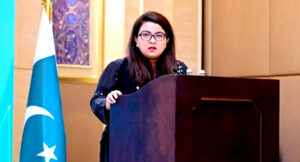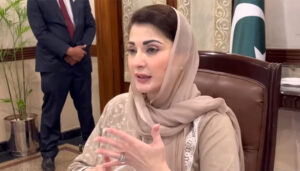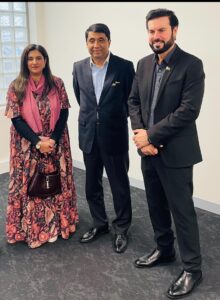Pakistan’s Bold Tech Win Sparks India’s Silent Concern
Bold Tech Win Sparks Global Debate: Pakistan Surges Ahead in IT Race
Pakistan’s IT sector has experienced a major breakthrough that has ignited conversation worldwide. In a bold statement, Pakistan’s Federal Minister for Information Technology, Shaza Fatima, declared that Pakistan has won the technology war against India. This announcement, made during the launch of TikTok’s STEM Feed in Islamabad, symbolizes a dramatic shift in South Asia’s digital landscape.
This bold tech win sparks not only national pride but also raises eyebrows across the border. The minister’s claims reflect a growing confidence in Pakistan’s digital future and its rapid emergence as a global tech player. Pakistan’s Bold Tech Win Sparks India’s Silent Concern

Pakistan’s Rising Digital Power: A Data-Driven Achievement
In recent years, Pakistan’s digital transformation has gained momentum. According to Shaza Fatima, internet usage across the country has significantly increased in the past year. This surge has contributed to economic empowerment, educational access, and youth engagement.
“Pakistan has not only caught up with global trends but is now leading digital innovation in the region,” said the minister.
This growth is not accidental. It stems from targeted efforts by the government, including the expansion of broadband access, digital skills programs, and tech-based youth initiatives. The launch of the STEM Feed with TikTok marks a strategic move to harness the power of social media for educational and professional development.
Empowering the Youth: The Heart of Pakistan’s Tech Strategy
One of the strongest points made by Shaza Fatima was the urgent need to equip Pakistan’s youth with digital skills. With over 60% of the population under the age of 30, the potential to build a skilled, future-ready workforce is enormous.
She urged young Pakistanis to:
-
Explore digital learning platforms.
-
Leverage tools like TikTok to learn coding, STEM, and media skills.
-
Use tech knowledge to start businesses or seek international opportunities.
This focus on youth empowerment through technology shows that Pakistan is not just catching up—it’s planning for long-term leadership in the tech space.
The Bold Tech Win Sparks India-Pakistan Comparisons
No bold claim comes without criticism or competition. Shaza Fatima’s declaration that “Pakistan has beaten India in the technology race” instantly sparked debate across South Asia.
Positive Highlights:
-
Pakistan’s tech exports have shown steady growth.
-
Government investment in IT parks and digital infrastructure.
-
STEM-based learning programs targeting remote areas.
Negative Challenges:
-
Internet speed concerns in rural areas.
-
Limited access to high-quality equipment in low-income sectors.
-
Ongoing cybersecurity vulnerabilities.
Despite these hurdles, the “Bold Tech Win Sparks” narrative remains strong, especially when viewed through the lens of digital inclusion and long-term infrastructure planning.
Creating Digital Identities: A Future-Ready Vision
Another major highlight of the minister’s speech was the initiative to assign digital identities to every child in Pakistan. This step is expected to:
-
Streamline access to education and healthcare.
-
Improve integration with banking and online financial services.
-
Reduce fraud and identity theft risks.
Such initiatives clearly align with global digital transformation goals, giving Pakistan a stronger position on the international tech stage.
TikTok as a Learning Platform: A Controversial Yet Innovative Move
While TikTok is often criticized for its entertainment-centric content, Shaza Fatima called it a “powerful learning tool”. The new STEM Feed aims to:
-
Promote STEM (Science, Technology, Engineering, Math) subjects.
-
Help students from all backgrounds learn complex concepts through short-form videos.
-
Engage with content creators who teach coding, robotics, and digital marketing.
Though some critics argue this may distract students, the move has been praised for its out-of-the-box thinking and youth-oriented approach.
Economic Impact of Pakistan’s Tech Victory
The IT minister emphasized that the growth of Pakistan’s digital economy will not only enhance services but also create employment opportunities. Here’s how:
| Sector | Impact |
|---|---|
| E-commerce | Increased demand for local online stores |
| Freelancing | Rise in youth working on global platforms |
| FinTech | Greater inclusion via mobile banking apps |
| Software Export | Boost in global software outsourcing |
| EdTech | Platforms providing education via apps |
These changes contribute to a resilient and self-sustaining tech ecosystem, positioning Pakistan as a potential hub for global digital outsourcing.
Government’s Commitment to Internet Speed and Access
Acknowledging existing infrastructure gaps, Shaza Fatima assured the public that internet speed issues are being resolved. The government has launched several public-private partnerships to:
-
Upgrade fiber-optic networks.
-
Provide affordable 4G and 5G services.
-
Train local professionals to support IT infrastructure.
Such practical steps complement the bold claims and offer a balanced perspective on where Pakistan currently stands.
Bold Tech Win Sparks National Optimism
The phrase “Bold Tech Win Sparks” is more than a headline—it’s a signal of hope and ambition. While India remains a dominant tech player in the region, Pakistan’s recent moves show a new willingness to compete on global standards. This marks a shift from dependency to innovation and resilience.
Even skeptics now recognize that Pakistan’s tech journey is no longer limited to catching up—it’s now about leading.

Conclusion: Will Pakistan Become South Asia’s Tech Leader?
Shaza Fatima’s powerful statements have drawn attention both regionally and internationally. Whether or not Pakistan has already surpassed India in the tech race may still be up for debate, but one thing is certain:
This bold tech win sparks a new chapter in Pakistan’s digital future.
With the right investments, inclusive policies, and youth engagement, Pakistan could soon become one of Asia’s most dynamic technology hubs





Pingback: Top 10 Future Technology Positive Negative Impacts